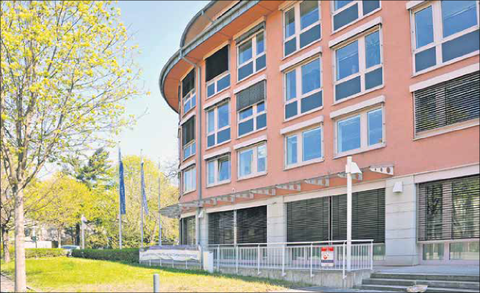"Our center can be a label for the university"
A year ago, the Centrum Frankreich | Frankophonie was founded, which is also based on the CIFRAQS

Das Gebäude der Fakultät Sprach-, Literatur- und Kulturwissenschaften an der Wiener Straße ist auch Sitz des Centrums Frankreich | Frankophonie
Beate Diederichs
In: Dresdner Universitätsjournal, Vol. 30 / No. 8, April 30, 2019, page 4.
The Centtum France | Francophonie (CFF) was founded at TU Dresden just over a year ago. Roswitha Böhm, Chair of French Studies and founding director of the CFF, takes stock together with coordinator Lisa Gulich and looks ahead to the future of the center.
When the Centrum Frankreich | Frankophonie was founded at the end of 2017, founding director Roswitha Böhm had two ideas that she wanted to develop further: Firstly, that of Ingo Kolboom, the professor who had established her Chair shortly after the fall of the Berlin Wall and had held it for many years. Thanks to his initiative, there was an interdisciplinary center at the TUD, the CIFRAQS (Centre for Interdisciplinary Franco-Canadian Research / Québec-Saxony), which focused primarily on cultural relations between Saxony and Québec, Canada. Secondly, her own: "During my time at the Freie Universität Berlin, I worked at the France Center there and noticed that such a center is a label, a trademark of a university.
The CFF can also become such a label at the TUD. We want to promote the internationalization of the university as far as France and the French-speaking world are concerned," says the professor. "We" is by no means limited to herself and her colleague Lisa Gulich, Research Associate and Coordinator of the CFF, but primarily refers to its members, which include professors from the Faculty of Arts, Humanities and Cultural Studies and the Faculty of Philosophy, but also from other departments, such as the Faculty of Mechanical Science and Engineering or the Faculty of Medicine. In the future, Roswitha Böhm and Lisa Gulich would like to give the centre a sustainable organizational structure and recruit additional members and new partners. One of the CFF's tasks is to promote scientific and cultural exchange between TUD stakeholders and partners in France and the French-speaking countries, to network activities on this topic and to act as a competence mediator for the French and French-speaking cultural area.
The professor uses a simple example to explain how the latter can work: CFF member Martin Hartmann, Chair of Metals and Machine Technology / Vocational Didactics, needed French interpreters for a project with participants from Burkina Faso. He found them through the Centrum: Romance Studies students from the French Department interpreted for the project. In addition to such collegial support, the CFF is particularly interested in academic cooperation: a binational conference on the transcultural dimensions of vocational training is currently being planned. "Another interesting cooperation came about during an exchange with partners from Marrakesh via the Erasmus+ program. This was initially applied for jointly by the Teaching Center for Languages and Cultures and the Institute of Romance Studies at the SLK Faculty. Colleagues from forestry are now also involved in the exchange - two of these academics recently traveled to Marrakech for a research visit," reports Roswitha Böhm. Return visits and further expansion are already planned. "This can also help to break down the prejudices that exist about the other country," emphasizes Lisa Gulich. In addition to collaborations, events and seminars are another area of the center's work: readings on contemporary French and Francophone literature take place regularly, usually at the Villa Augustin Literature House. In this way, the initiators aim to reach not only the university audience but also the Dresden public. The block seminars within the CFF poetry lectureship of the poet Cécile Wajsbrot are aimed primarily at students of Romance studies. A DRESDEN Fellowship, part of a program for visiting researchers, made this possible. "The participants were very enthusiastic about it," says Roswitha Böhm. For this reason, a scientific colloquium will be held next semester as a follow-up. In the long term, the professor and her colleague Lisa Gulich can imagine a series of lectures on current social issues, which will be examined from a German, French and Francophone perspective.
In the medium term, the official opening of the center is planned. "This was actually planned for 2018. But we wanted Bénédicte Savoy, a French art historian who teaches in Berlin and works on the subject of looted art, to be the keynote speaker. Unfortunately, she has such a tight schedule that she won't have time until May this year," reports Lisa Gulich. At the moment, the coordinator is busy with the detailed organization of the event on 16 May, which is to take place in the University Executive Board's ballroom. The lecture that Bénédicte Savoy will give there has a dual function: In addition to being the highlight of the opening, it is intended to kick off the planned series of events.
